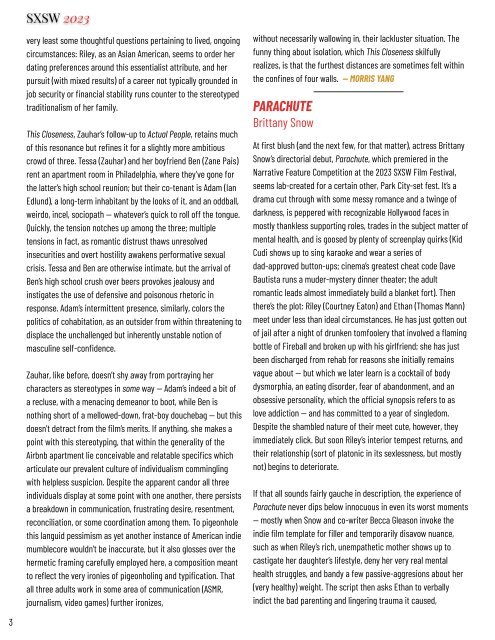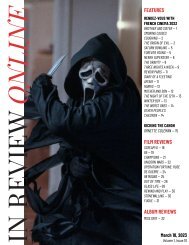Create successful ePaper yourself
Turn your PDF publications into a flip-book with our unique Google optimized e-Paper software.
SXSW 2023<br />
very least some thoughtful questions pertaining to lived, ongoing<br />
circumstances: Riley, as an Asian American, seems to order her<br />
dating preferences around this essentialist attribute, and her<br />
pursuit (with mixed results) of a career not typically grounded in<br />
job security or financial stability runs counter to the stereotyped<br />
traditionalism of her family.<br />
This Closeness, Zauhar’s follow-up to Actual People, retains much<br />
of this resonance but refines it for a slightly more ambitious<br />
crowd of three. Tessa (Zauhar) and her boyfriend Ben (Zane Pais)<br />
rent an apartment room in Philadelphia, where they’ve gone for<br />
the latter’s high school reunion; but their co-tenant is Adam (Ian<br />
Edlund), a long-term inhabitant by the looks of it, and an oddball,<br />
weirdo, incel, sociopath <strong>—</strong> whatever’s quick to roll off the tongue.<br />
Quickly, the tension notches up among the three; multiple<br />
tensions in fact, as romantic distrust thaws unresolved<br />
insecurities and overt hostility awakens performative sexual<br />
crisis. Tessa and Ben are otherwise intimate, but the arrival of<br />
Ben’s high school crush over beers provokes jealousy and<br />
instigates the use of defensive and poisonous rhetoric in<br />
response. Adam’s intermittent presence, similarly, colors the<br />
politics of cohabitation, as an outsider from within threatening to<br />
displace the unchallenged but inherently unstable notion of<br />
masculine self-confidence.<br />
Zauhar, like before, doesn’t shy away from portraying her<br />
characters as stereotypes in some way <strong>—</strong> Adam’s indeed a bit of<br />
a recluse, with a menacing demeanor to boot, while Ben is<br />
nothing short of a mellowed-down, frat-boy douchebag <strong>—</strong> but this<br />
doesn’t detract from the film’s merits. If anything, she makes a<br />
point with this stereotyping, that within the generality of the<br />
Airbnb apartment lie conceivable and relatable specifics which<br />
articulate our prevalent culture of individualism commingling<br />
with helpless suspicion. Despite the apparent candor all three<br />
individuals display at some point with one another, there persists<br />
a breakdown in communication, frustrating desire, resentment,<br />
reconciliation, or some coordination among them. To pigeonhole<br />
this languid pessimism as yet another instance of American indie<br />
mumblecore wouldn’t be inaccurate, but it also glosses over the<br />
hermetic framing carefully employed here, a composition meant<br />
to reflect the very ironies of pigeonholing and typification. That<br />
all three adults work in some area of communication (ASMR,<br />
journalism, video games) further ironizes,<br />
without necessarily wallowing in, their lackluster situation. The<br />
funny thing about isolation, which This Closeness skilfully<br />
realizes, is that the furthest distances are sometimes felt within<br />
the confines of four walls. <strong>—</strong> MORRIS YANG<br />
PARACHUTE<br />
Brittany Snow<br />
At first blush (and the next few, for that matter), actress Brittany<br />
Snow’s directorial debut, Parachute, which premiered in the<br />
Narrative Feature Competition at the 2023 SXSW Film Festival,<br />
seems lab-created for a certain other, Park City-set fest. It’s a<br />
drama cut through with some messy romance and a twinge of<br />
darkness, is peppered with recognizable Hollywood faces in<br />
mostly thankless supporting roles, trades in the subject matter of<br />
mental health, and is goosed by plenty of screenplay quirks (Kid<br />
Cudi shows up to sing karaoke and wear a series of<br />
dad-approved button-ups; cinema’s greatest cheat code Dave<br />
Bautista runs a muder-mystery dinner theater; the adult<br />
romantic leads almost immediately build a blanket fort). Then<br />
there’s the plot: Riley (Courtney Eaton) and Ethan (Thomas Mann)<br />
meet under less than ideal circumstances. He has just gotten out<br />
of jail after a night of drunken tomfoolery that involved a flaming<br />
bottle of Fireball and broken up with his girlfriend; she has just<br />
been discharged from rehab for reasons she initially remains<br />
vague about <strong>—</strong> but which we later learn is a cocktail of body<br />
dysmorphia, an eating disorder, fear of abandonment, and an<br />
obsessive personality, which the official synopsis refers to as<br />
love addiction <strong>—</strong> and has committed to a year of singledom.<br />
Despite the shambled nature of their meet cute, however, they<br />
immediately click. But soon Riley’s interior tempest returns, and<br />
their relationship (sort of platonic in its sexlessness, but mostly<br />
not) begins to deteriorate.<br />
If that all sounds fairly gauche in description, the experience of<br />
Parachute never dips below innocuous in even its worst moments<br />
<strong>—</strong> mostly when Snow and co-writer Becca Gleason invoke the<br />
indie film template for filler and temporarily disavow nuance,<br />
such as when Riley’s rich, unempathetic mother shows up to<br />
castigate her daughter’s lifestyle, deny her very real mental<br />
health struggles, and bandy a few passive-aggresions about her<br />
(very healthy) weight. The script then asks Ethan to verbally<br />
indict the bad parenting and lingering trauma it caused,<br />
13
















